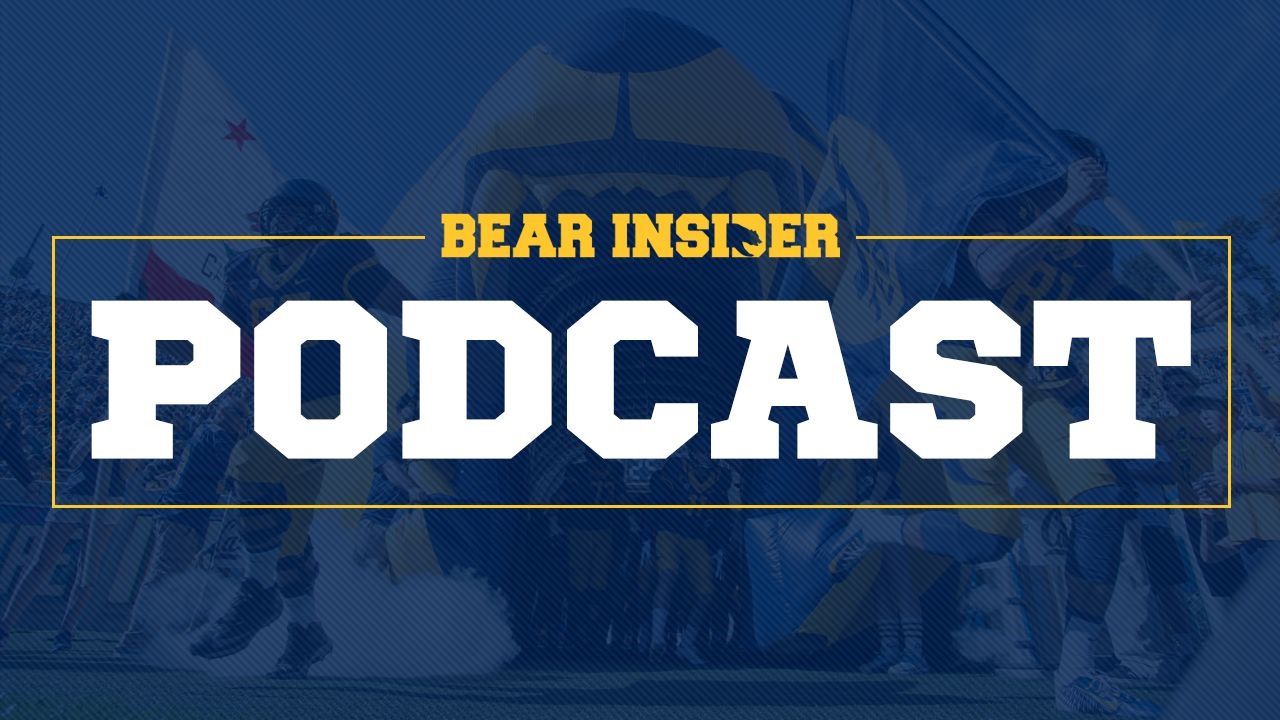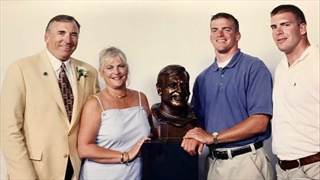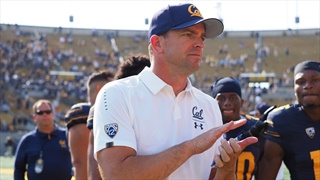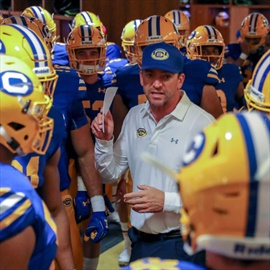
Bear Insider Podcast: Cal Football Head Coach Justin Wilcox
Justin Wilcox Bear Insider Podcast
You could say Cal head coach Justin Wilcox has football in his blood, growing up in an athletic family and the son of NFL Hall of Fame linebacker Dave Wilcox.
Did his Dad’s successful professional career have a big impact on young Wilcox’s early years and athletic endeavors?
“No, just because in those days, he had been retired before I was born,” said Wilcox. “There might’ve been some paraphernalia in his office, but other than that, it was just a normal upbringing. We didn’t really talk about his background in football.
“It was well before social media and we didn’t really have videos. Maybe a couple scrapbooks. And maybe in his office, there were some Pro Bowl awards or a couple pictures but it wasn’t something to adorn the whole home or anything,” said Wilcox.

Father Dave’s induction into the NFL Hall of Fame came in the iconic 2000 Hall of Fame class as the future Cal head coach was just beginning to get involved in his young coaching career.
“That was right after I finished playing college football,” said Wilcox.
“In my younger days, me and my brother had two supportive parents all through high school athletics and college football. Then when that finished, he got inducted into the Pro Football Hall of Fame, which was really a neat thing to watch.
“To see that whole process and how it really changed his life in a number of ways -not him as a person but how people viewed him. He was the same player as he was before but all of a sudden, he became really important. He got inducted with Joe Montana, Ronnie Lott, Howie Long, Mr. Rooney (longtime Pittsburgh Steelers owner Art Rooney) -that was really a neat experience to watch and take a small part in.
“I was just really happy for him and how he’s handled his life.”
Despite a stellar playing career and the ultimate honor bestowed on former NFL players, the Wilcox family didn’t enjoy the riches and trappings involved with today’s top players during and after retirement with massive multi-million dollar contracts.
“Pro football in those days, it was a good job but a lot of them worked in the offseason,” noted Wilcox. “It wasn’t like they earned the money that they guys earn now because it’s become such an entertainment industry.
“He retired from football and moved back to Oregon. After I was born, it was all farming because that’s what he knew growing up.”
The Wilcox farm was a family endeavor and the Wilcox boys were expected to play a role in keeping thing running from a young age -unless they could find an occasional legitimate way out.
“You worked unless you could find a sport to play,” said Wilcox, with a smile. “That was always the key, to see how many sports you could play and after school activities. That was the way out of the manual labor.”

Lest anyone think the always hard-working Wilcox managed to get out of all of the myriad of family chores and farming responsibilities he often had, Cal’s future head coach did more than his share of hard work over his formative years and appreciated the benefits and results that hard work offered, helping work the 100-150 acres of beans, corn, grass seed, mint and more, though mint was hardly his favorite crop.
“We did mint a couple times,” noted Wilcox, with a bit of a grimace. Bad memories of mint...
“I really enjoyed it (overall). I liked being outside and being in that environment and learning how to do those things.
“It was a humble, low-key kind of lifestyle. Looking back, I learned a lot. A: For having two really supportive parents but also kind of living a grounded lifestyle. It teaches you a lot.
“It’s changed a lot over the years. Big business has kind of taken over. My family still has the farm but a guy I went to high school with farms all the land. Some of the smaller mom and pop farms, it’s becoming more difficult for them.”
Wilcox grew up playing sports with his older brother Josh, who starred at tight end for Oregon (setting the Rose Bowl record for most catches) before playing a bit in the NFL with the New Orleans Saints as well as the World League for Amsterdam -rooming with future NFL star Kurt Warner- along with the XFL, where his LA Express team won the championship, and also the Arena League.
“He was a talented guy, a really hard-worker,” said Wilcox. “He was a lot bigger than I was.
“I followed him through high school and college. We were teammates for those years, a couple swing years we were together. If was helpful with him having already been through it.”
The older Wilcox was every bit as competitive as his younger brother and the pair mixed it up many times over the years playing together.
“For sure, we were very competitive,” said Wilcox. “We grew up in a very competitive environment. Like a lot of siblings, the backyard basketball, the backyard football -those things got rough. Probably for me, it helped me learn how compete. You just had to learn how to hang in there.
“He was big and strong and I was not really built the same so I had to find a way to navigate how to stay in the game, so to speak. I learned a lot of lessons, just playing one-on-one, then in high school and college, kind of showing me the way. He was a really hard-working guy.”
At Junction City High School, Wilcox starred on the football team, winning a state championship as a junior, playing at various times quarterback, cornerback and safety. He also played on Junction City’s state champion basketball team and ran track, competing in the 4x100 and 4x400 relays as well as triple jump.
“I went to a smaller high school,” noted Wilcox. “It was the only school in town and I think everyone played sports. I had some great teammates and we were a successful team. I had a great group of friends and coaches. It was really important to the students, the players and coaches and people in the community.
“That’s what I look back on that was so valuable, how everybody supported each other and were accountable. Everybody was vital to the team. I just remember really learning how to compete. My coaches in football, basketball and track I thought really just gave me great messages on how to compete. That was what I took from the whole experience. The value of teamwork, hard work. Open gym over the summer, everyone was there. That’s where we went. And winter break, they’d open the gym and we’d just beat on each other playing basketball.”
The lessons Wilcox learned in his formative years didn’t just apply to athletics. The Junction City community had a very active student body, participating in various programs and activities nearly year-round.
“That’s just what you did,” said Wilcox. “You were involved in something, whether you were an athlete, in drama or woodshop or FFA (Future Farmers of America) -every kid was always doing something. That to me, is what was most important. Looking back on it, that’s what I most learned. Being involved, being invested in something.”

Following Wilcox’s successful collegiate career, there were many carryover coaching connections from his stint at Oregon as a player to his original time at Cal as well as his current staff.
Offensive line coach Steve Greatwood had coached his brother Josh and had a strong influence on the Wilcox family. Bob Foster, who preceded Wilcox’s first stint at coach as linebacker coach at Cal and mentored him along the way was at Oregon with Wilcox, as well. Former Cal DC Bob Gregory coached at both Oregon and Cal while Wilcox was there. Current LB Coach and Co-DC Peter Sirmon played with Wilcox at Oregon. Former Cal head coach Jeff Tedford was also the OC at Oregon when Wilcox played there.
After graduating from Oregon in ‘99, Wilcox went on to be a grad assistant at Boise State, where Oregon coach Bob Gregory had previously been and recommended Wilcox for the job.
“I thought the world of Bob and still do and when he went to work for Coach Tedford at Cal, after his first year here, Coach Foster retired and (the connection was) really the only way I could get an opportunity this early happened. Coach Gregory called and of course, I was interested right away to get my foot in the door to coach.
“I was able to spend three really great years here and I learned a ton -not only about coaching from Coach Tedford and Coach Gregory and how you do things,” said Wilcox. “And recruiting. That was a big part of it and I worked really hard at that. I guess it gave me a great insight into Cal.
“We had some really good teams during that time and some fantastic players. The chemistry and how things worked here, it was a really special time to be here.”
The Bears would go 26-12 during Wilcox’s first tenure at Cal.
Wilcox went on to a promotion to defensive coordinator at Boise State, followed by largely successful stops at Washington, USC, Tennessee and Wisconsin as DC.
“You learn from the people you’re around -the head coaches, the coaches on defense, the coaches on offense,” said Wilcox. “You learn a lot from the players. They’re always evolving. Things have changed dramatically in the way we teach and coach players over the last 15 years. And there’s some fundamentals that will never change for me.
“Going from place to place and seeing how they do things -some of which I’ve tried to adopt and make our own for our program. And there’s certain things that coaches do that you don’t incorporate. There’s a lot of different ways to do things. I’ve been really fortunate to be around some great people and some great programs and learn a ton along the way. A lot of it is what to do and a lot of it is what not to do. You’re just constantly learning.
“You have this foundation of what you’re about, how you see the program moving and growing. Each experience you have, you’re sharpening that sword. You’re constantly doing it. If that ever stops, it means you either have the magic formula and you sell it -that’s not ever going to happen because you’re always learning- or you’re constantly trying to get better and adjust. You don’t want to lose that mentality.”
Being a defensive-minded coach, Wilcox walked into a difficult situation at Cal, where the Bears spent several years near the bottom of the national rankings in most every defensive category before he took over.
The Bears narrowly missed bowl eligibility in his first season, finishing 5-7. That was followed by 2018’s 7-5 regular season, including a win over Pac-12 champ Washington and a bowl game appearance.
The turnover on defense happenned virtually immediately and in his second season, the Bears finished ranked fifteenth in overall defense.
“I think to get to this level -to get the Pac-12 and be recruited- you have to have some talent said Wilcox. “I think the key for us was to give them some standards for what we do, whether on offense, defense or special teams and hold them to those standards.
“We’re fortunate to have had some good players and we sit here today with some really good football players. (On defense) we’re more experienced on that side of the ball. I didn’t necessarily have numbers that this is where we should be in terms of numbers by year three. You’re looking to play winning football. The number one thing that’s allowed us to get better across the board in the guys’ attitude in doing what we’re asking them to do.
“We’ve had some success, especially on that side of the ball. It’s not just about the scheme or some drill we’re doing. It takes everybody. Instruction, it takes talent, it take culture. It takes all those things.
“We’ve added more and more the longer we’ve been here in the nuances of the game. If you look at the guys on defense, they’re a little more veteran and they know how to play. Weav, Luc Bequette -some of these guys with a lot of reps under their belt, they’re learning the game within the game and how to become experts at their position.
“They’ve done a great job buying into what we’re trying to do. The way they come to meetings -they’re in there yearning for information. ‘Tell me how we’re going to beat this team. Tell me how we’re going to mess with the quarterback on third-and-six.’ I think that mindset’s really developed and it’s helped us play well and gives validation to what we’re trying to do.”
“But in the end, you’ve got to have talent.”
What approach does Wilcox and staff take in assessing the right recruits to target outside of pure athleticism?
“We dive into what they’re into beside football,” noted Wilcox. “Obviously they’re talented. What else do they do at school? How do they interact with the student body and teachers? They’re not professionals yet. You’re looking for some character traits that will allow them to grow as a player. That’s probably the hardest thing you do in recruiting, to really find out who they are because you get a limited amount of time in recruiting to get to know them based on the way that rules are set up.”
Wilcox recently signed an extension running through 2023 that puts him in the upper echelon of Pac-12 coaches. Many Cal fans would like to see that extension and the progress Wilcox and staff have made with turning around the program turn into a longterm, sustainable run of success with Wilcox at the helm.
“I’d love for that to be the case,” said Wilcox. “I understand we’re in a results-driven business. I totally understand that.
“Having the support of the institution and the athletic department is huge. They understand where we’re going and how we’re doing things. We have a certain way that we’re going to do things here. We’re going to target certain people and do things our way and it fits Cal. They believe in it and we believe in it. And it feels good to know that we have their support. It takes everybody -coaches, players, the entire athletic department and the institution.”
“I know what we’re capable of doing here. It’s going to be hard. It’s going to take hard work and the right people and the right support. But I’m convinced we can do it. That’s what so exciting. And to have the support of the institution and the athletic department, we can get the right people to be very successful here.”
